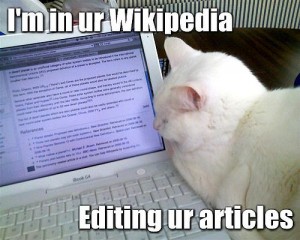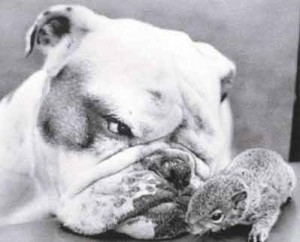Newsweek this week published “Take This Blog and Shove It!” saying that “Crowd Sourcing Loses Steam” and wondering why people didn’t want to edit Wikipedia anymore. They attributed it, among other things, to laziness. Blogging is down while microblogging is up, which is probably a causal relationship, but Wikipedia is suffering from something else entirely.
Wikipedia used to be fun
 I used to make small contributions to Wikipedia frequently. Never with an agenda, but because it was fun. Fun to read, fun to contribute. I found that reading something I knew I was welcome—even encouraged—to edit to be a very engaging kind of reading. Anyone else have that experience?
I used to make small contributions to Wikipedia frequently. Never with an agenda, but because it was fun. Fun to read, fun to contribute. I found that reading something I knew I was welcome—even encouraged—to edit to be a very engaging kind of reading. Anyone else have that experience?
At first, when I would find interesting information, or when reading Wikipedia about something I was familiar with, I would make small additions or corrections. If I checked back, I found the information was often left in place. Then it became more common for it to be edited, commented upon or changed. I thought this was good.
Then it became common for it to simply be removed. Quickly. That was no longer fun; I wasn’t being careless or superficial with my adds/changes, so I didn’t understand it at first
But, feeling casual contributors were no longer welcome, I lost interest in making small changes to improve clarity, since the rejections/loss of fun caused me to spend less time on Wikipedia. I still didn’t understand it though.
Wikipedians attack casual contributors
 Then one day the real reason became clear. I had been reading about how Wikipedians had become more and more protective of the site, even trying to ban good new contributors, suspicious that they might have been trying to build their reputations just so they could do damaging things later.
Then one day the real reason became clear. I had been reading about how Wikipedians had become more and more protective of the site, even trying to ban good new contributors, suspicious that they might have been trying to build their reputations just so they could do damaging things later.
In a word, paranoia had taken over.
But when I finally experienced it, it was fairly shocking. I added some information from a large website that was relevant to an article on Wikipedia. I quickly received a notice from a Wikipedian that he would see to it that I was banned if I ever did something like that again. My offense? The information I provided was insufficiently rigorous, and the lack of rigor made him angry and offended. He wasn’t offended at any pattern of behavior on my part, since it was the only thing of substance I had added in a year or so. He just flew off the handle.
Talking to others about this, I found my experience wasn’t uncommon. Wikipedia was now controlled by the extremely intolerant, because there was no barrier to them taking over. They infested the castle and ousted the previous residents. All the arguments about making Widipedia more rigorous, defending against people trying to add misinformation I understand. But the character of the people doing the work became the problem, not the reasons for their actions.
And while Wikipedia is still fun to browse, now it carries the scent of anger for me, of people hiding, waiting to ambush visitors for their offences. And so while I visit Wikipedia from time to time, I rarely browse it anymore. And sadly, I read with far less interest than I used to, looking to see if there is any kind of contribution I could make. Because the Wikidogs have taken their bone and gone home with it, and anyone trying to help is no longer welcome.
Wiki has probably been stuck by its own success.
Like you David, I used to add information, adding references where I could. Simply sharing my local knowledge and interests. I am not and will never be a disciplined academic or dictionary writer. As a practitioner I write and want to add to the body of knowledge out there.
As wiki grew there were some people who started to edit to deliberately mislead or simply have fun without looking at the impact of that fun: one of the village pages I edit included a reference to a dragon. I saw the funny side (it was a written joke) but I edited out that story because I felt the village deserved space for local myths that really were historic local myths rather than creating new stories: Wikipedia is an enclyclopedia and so should be factual.
There were others who posted copyrighted material and put it on wiki without permission of the owner: putting themselves and wiki the wrong side of the law. After threats of legal action, I saw the moderators’ attitude change and pages became more closely moderated.
Wiki also started to create wikimedia books . I know others stopped editing then: they were happy to work for the community but felt that if their contribution had value they could make their own money from it – they concentrated in the information marketing area after that.
Like Twitter, the more who use the site, the more information arrives. Unlike Twitter, the information on wiki stays there and builds on each page. This meant some of the pages were nolonger easy to read and needed to be reduced for readability. That editing process meant that some of the more individual pages became more structured – it makes it easier for general readers to get information quickly by it looses character. It also meant that some pages were deleted entirely because they related to things or places that had little value in the moderator’s eyes. Try explaining why, for a group of 5 villages in an area, 2 villages pages get deleted repeatedly but the other 3 remain (one of which is a very old page with little information).
Of course, there could be another reason why people have stopped contributing: If those that were interested in contributing all joined at roughly the same time perhaps we’ve run out of things to say and the new joiners don’t feel they have much to add. I don’t think the newbies feel as encouraged as those of us who started in the earlier years ago.
Great explanation of how Wikipedia’s challenges expanded as they grew, Carol! Competition for attention and the changing needs of Wikipedia have clearly combined to limit the time spent on the site by editors.